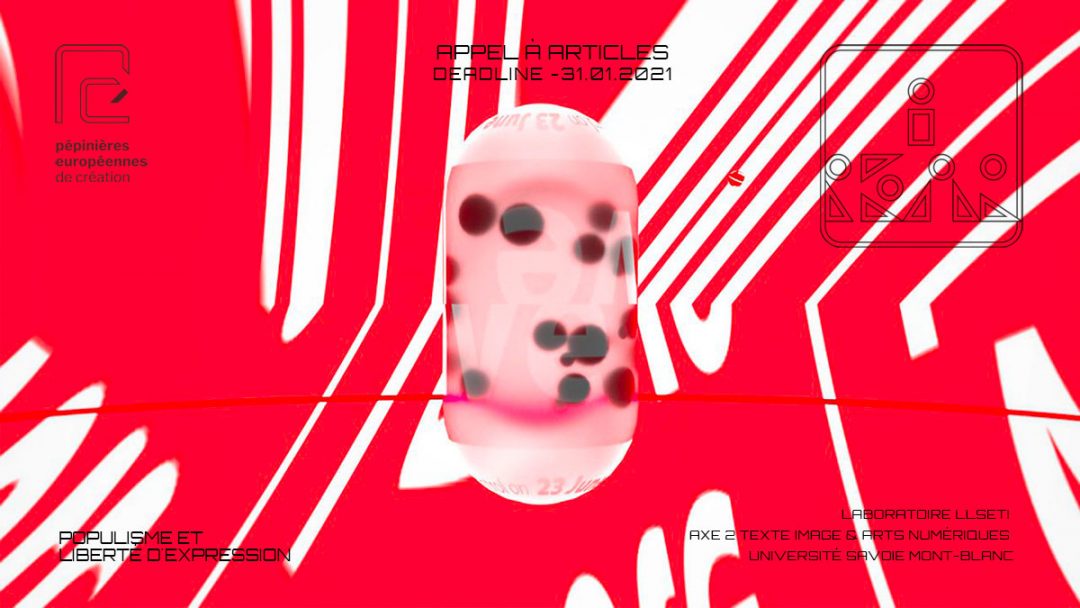The LLSETI Lab (Axis 2 – Text Image & Digital Arts – Savoie Mont-Blanc University), is launching a call for papers under the theme Populism and freedom of expression, supported by its various partners (including the European Pepinieres of Creation).
Deadline : January 31, 2020 (midnight Paris time)
Day(s)
:
Hour(s)
:
Minute(s)
:
Second(s)
Call for papers – Argument
Fundamental to liberal democracies, freedom of expression in general, and that of the media in particular, is threatened by the rise of populist ‘illiberal democracies’ and new forms of information technology. In the West, as in other regions across the globe, democratically-elected authoritarian governments are taking an aggressive stance towards the media, often deemed to be working in the interests of the Establishment against the people, in a context in which the independence of the media in liberal democracies is questioned. Making the most of the opportunities provided by new technologies, these regimes claim the right to communicate directly with the people. Often taken for granted, the idea that there is an antagonistic relationship between populism and freedom of expression is surely more complex than it may seem at first sight. It seems timely to delve further into this topic.
/
Three key questions can be asked. The first concerns the relationship between populism and the mainstream media. What do populists say about the media? Is it possible to pinpoint populist strategies vis-à-vis the media, and what is their aim? How do the media deal with and represent populist trends? How do they define populism and who do they designate as populist?
/
The second question concerns the use and the appropriation of social media by populists. How does it impact upon their political strategies? How does the use of trolls and fake news to manipulate public opinion impact on the relationship between truth and freedom of expression?
/
Finally, what is the relationship between populism and the liberal State? Can the State’s attempts to stem the rise of populism by regulating new forms of information technology and legislating against ‘fake news’, as France has done for example, be described as counterproductive and ineffective, infringing the right to the freedom of expression that it seeks to protect?
These questions will be answered from a comparative perspective in an attempt to draw out the role played by specific cultural factors and by the transfer of certain models from one national context to another. An interdisciplinary approach will be adopted, ranging from linguistics and semiology (analysis of discourse, images and symbols) through to political science.
Scientific Council
- Jean-Eric Branaa, Université Paris II Panthéon-Assas
- Jacques Ibanez-Bueno, Université Savoie Mont Blanc
- Monika Kopytowska, Université de Lodz, Pologne
- Arnaud Mercier, Université Paris II- Panthéon-Assas
- Denis Ramond, Centre Jean Bodin, Université d’Angers
- Karine Tournier-Sol, Université de Toulon
- Marc Veyrat, Université Savoie Mont Blanc
Infos
- Deadline : 31.01.2021
- Feedback: March 2020
- Publication scheduled for September 2021
- Langues : French and/or English
- Send your text.s to :
- Emma Bell : emma.bell@univ-smb.fr
- Jean-Marie Ruiz : jean-marie.ruiz@univ-smb.fr
- Marc Veyrat : marc.veyrat@univ-smb.fr
Production
- Laboratoire LLSETI – Axe 2 Texte Image & Arts Numériques – Université Savoie Mont-Blanc
- With the support of Transcultures and European Pepinieres of Création (in the framework of i-Real project – Société i Matériel Marc Veyrat)

